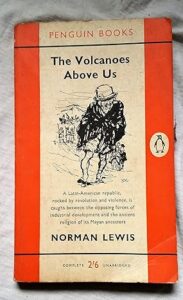
I first heard about this book from a podcast, Personal Landscapes, by Ryan Murdock, who interviewed biographer Julian Evans, “Norman Lewis: The 20th Century’s Greatest Travel Writer.” This caught my attention because Norman Lewis wrote a book about Guatemala. The podcast reveals what made this author and this book special. https://www.youtube.com/watch?app=desktop&v=ri3-amHtYGs
Lewis was brought up in a bizarre family situation and didn’t have access to the education or other advantages many of the travel writers of that period had. He had an instinct to be in the right place to capture traditional ways of life on the brink of modernity, with an unerring eye for the absurd, making his writing so enjoyable.
The author wrote a satirical novel about one of the great social divides in Guatemalan society, the division between the Mayan Indigenous community and the Europeanized, Spanish-speaking “Ladino” population. His fictional depiction of some of the absurdities and lack of respect for the Indigenous community is notable despite them representing over 50% of the population. He describes the Ladinos as “people who dress in Western fashions as well as they can afford, who like to ride rather than walk, to work without soiling the hands, to promenade at set hours and in the proper places, to marry their daughters well, to dabble in politics, and to accumulate money. An infinite distance separates them from the Indian side of their ancestry.”
The story takes place in an exotic part of the country, outside of Coban in Alta Verapaz, where “beautiful women produced by the union of the German planters with the pick of the local Indian women.”
He depicts a society torn between an internal and external revolution and the conflicts between the traditional Indian labor force and American industrialization, which was mediated by transitional dictatorships that shifted with the wind and foreign corporations. David Williams is the narrator and accepts a bogus military assignment to recover his coffee plantation, which he lost due to land reform.
Williams was tasked by a new dictator’s plans to persuade the Chilam Indians that their “industrial peonage” would be to their advantage. At one point, one of the characters refers to the Indians as “stone-age proletarians.” His barbed criticism of an American operator, Elliot, reflected his sympathies for the Mayan community. He instigates a type of benevolent slavery, but turns the rather bizarre setting into a form of tourist trap. Lewis paints a rather depressing portrait of a country in the throes of upheaval, consistent with real political life in Guatemala today.
Lewis’s satire is effective in depicting the total disrespect of Guatemala’s ruling class for the Indigenous community, which is often overlooked or misunderstood by outsiders. I’ll add this book to the bibliography of my next book, The Guatemala Reader.
Product details
- Publisher : Arrow Books (A Division of Random House Group) (March 2, 1989)
- Language : English
- Paperback : 256 pages
- ISBN-10 : 0099605309
- ISBN-13 : 978-0099605300
- Item Weight : 7 ounces
- Best Sellers Rank: #4,228,982 in Books (See Top 100 in Books)
- #50,064 in Contemporary Literature & Fiction
The Author
Norman Lewis was a British writer who died at 95 in 2003. While best known for his travel writing, he also wrote twelve novels and several volumes of autobiography.
Subjects he explored in his travel writing include life in Naples, Vietnam, Indonesia, Burma, and the destruction caused by Christian missionaries.
His newspaper article entitled “Genocide in Brazil” (1969) prompted the creation of Survival International, an organization dedicated to the protection of Indigenous people around the world.
Graham Green described Lewis as “one of the best writers, not of any particular decade, but of our century.”
The Reviewer
Mark Walker was a Peace Corps Volunteer in Guatemala and spent over forty years helping disadvantaged people in the developing world with agencies like Food for the Hungry, Make A Wish International, and Hagar USA. His book, Different Latitudes: My Life in the Peace Corps and Beyond, was recognized by the Arizona Literary Association. His second book, My Saddest Pleasures: 50 Years on the Road, won the 2023 Peace Corps Writers’ Award for Best Travel Book. He’s a contributing writer for Literary Traveler, Wanderlust Journal, and The Authors’ Show. “The Million Mile Walker Review: What We’re Reading And Why” can be found in the Arizona Authors’ Association Newsletter, Authors Digest. His wife and three children were born in Guatemala. You can learn more at www.MillionMileWalker.com.